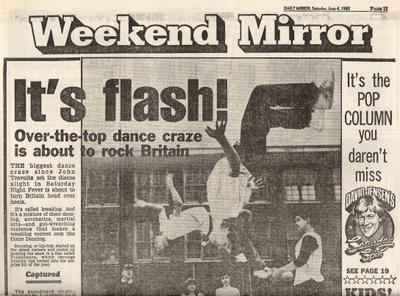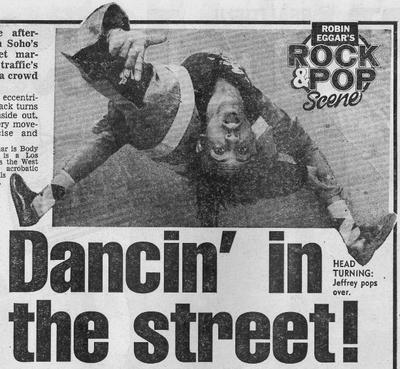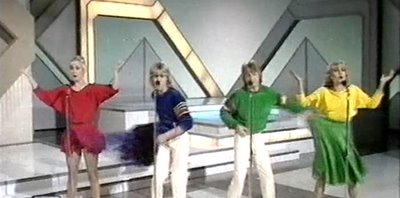 From the Daily Mirror, 4/6/1983:
From the Daily Mirror, 4/6/1983:
The biggest dance craze since John Travolta set the discos alight in "Saturday Night Fever" is about to turn Britain head over heels.
It's called breaking. And it's a mixture of disco dancing, acrobatics, martial arts - and gut wrenching violence that makes a wrestling contest look like "Come Dancing".
Breaking, or hip-hop, started on the street corners and ended up stealing the show in a film called "Flashdance", which teenage America has turned into the surprise hit of the year.
The soundtrack single - America's No 1 - is already out in Britain, and the film opens later this month. It tells the story of a young girl, played by unknown student Jennifer Beales, who works as a welder and dreams of being a ballet star.
On the road to fame she brings her sexy, breaking-style routines to a nightclub audience, and these are the scenes that captured the imagination of teenagers and packed cinemas from coast to coast.
"Flashdance" made 20-year-old Jennifer a star overnight. But the real stars of breaking are the kids from the backstreets who created the craze.
They gather in America's big cities and launch into solo dances, or breaks, to a beat throbbing from a ghetto-blaster - a giant, portable stereo system.
They dash themselves to the ground, rolling and spinning on hands, necks and bottoms. Or they hurl themselves in the air turning back somersaults and freezing so that they land with a spine-jarring crash...
"Street dance can be just a form of aggression," said Jeff Kutash, who is touring Britain with Dancin' Machine, his troupe of street dancers.
"There's one move called the body slam, where two dancers hurl themselves against each other and bounce off on the rythm. That's popular in the punk clubs in America.
"I've seen cut eyebrows and broken bones. It's a bloodbath."
With the cult go names. In Jeff's group there is Mr X, a swaggering dancer in sequinned denim, Bad News, Sugarfoot and Ricochet Rabbit.
The street scenes in "Flashdance" are the work of the Rocksteady Crew, New York's first professional street dance gang.
Like Dancin' Machine, they perform stylised moves with names like the helicopter swipe, the coffee grinder and the frightening head roll, where a dancer stands on his head and gyrates using his neck muscles.
The milder forms of street dance are already taking off in Britain. There is Street Poppin', made up of jerky muscular spasms, and the gritty, hip-thrusting Nasty Girl and Gigolo.
As the craze spreads, the producers of "Flashdance" are dancing in the streets, too. Within two weeks of being released the 8.5 million dollar film has earned 11.3 million dollars.
The soundtrack LP - out in Britain at the end of this month - sold 700,000 copies in America in the first fortnight.
The single "Flashdance - What a Feeling", shot to the top of the charts there and went straight into the British charts at No 30 this week.
"Flashdance" opens at four London cinemas on June 30 and goes on general release a week later.
 From the Daily Mirror, 21/6/1983:
From the Daily Mirror, 21/6/1983:Suddenly the afternoon bustle in Soho's Berwick Street market dies away. The traffic's at a standstill and a crowd has gathered.
They watch as an eccentrically dressed young black turns his body seemingly inside out. And upside down. Every movement is slow, precise and sinuous.
Jeffrey Daniel of Shalamar is Body Popping. Body popping is a Los Angeles street dance. It is the West Coast equivalent to the acrobatic "break dancing" that steals the new "Flashdance" movie.
Jeffrey gave Britain its first stunning taste of body popping when Shalamar appeared on "Top of the Pops" last June.
Until then they were just another faceless disco group. But Jeffrey's electrifying act helped push their single "A Night To Remember" into the charts.
By the end of the year Shalamar had notched up four hits in a row.
They sold out eight nights at London's Dominion Theatre and one at the Wembley Arena...
When Jeffrey is dancing it is hard to believe what he is doing with his body. One moment he glides backwards as if through quick-silver.
The next he shudders like a robot caught in the glare of a disco strobe light.
"Popping is slow and tightly conceived.
"But when it crossed over to the East Coast it became breaking - which is much more physical.
"Breaking is strictly acrobatic, spinning your body around your head or arms.
"Breakers are either gymnasts - or insane! With popping we never have to get on our heads or bounce off pavements."
 It's 1983 and we're all getting into exercise and some of the girlies are also getting into aerobics. And it's time to get into deodorant. And wear legwarmers when you work out. They're no longer just practical articles for draughty places. No, they're an essential fashion item. And you can always put deodorant on your shins and ankles to stop 'em getting all hot and niffy.
It's 1983 and we're all getting into exercise and some of the girlies are also getting into aerobics. And it's time to get into deodorant. And wear legwarmers when you work out. They're no longer just practical articles for draughty places. No, they're an essential fashion item. And you can always put deodorant on your shins and ankles to stop 'em getting all hot and niffy. Don't imbibe loads of sugar - drink fizzy diet drinks in your leg warmers. And then do some aerobics.
Don't imbibe loads of sugar - drink fizzy diet drinks in your leg warmers. And then do some aerobics. This is 1983, we have new hair styling products, so ditch the hairspray (you'll ruin the ozone layer) and scrunch in the gel or the mousse instead.
This is 1983, we have new hair styling products, so ditch the hairspray (you'll ruin the ozone layer) and scrunch in the gel or the mousse instead. L'ORÉAL FREE STYLE MOUSSE.
L'ORÉAL FREE STYLE MOUSSE. And when you've got loads of gunk - gel or mousse - in your hair, worry not. Timotei shampoo has just arrived so you can wash your hair as often as you like.
And when you've got loads of gunk - gel or mousse - in your hair, worry not. Timotei shampoo has just arrived so you can wash your hair as often as you like. Exotic perfumes like Choc de Cardin could suddenly waft you away to a foreign beach. Hopefully, it would also bring you home again.
Exotic perfumes like Choc de Cardin could suddenly waft you away to a foreign beach. Hopefully, it would also bring you home again. Eat sensibly. Keep an eye on your waistline with Waistline chicken and celery soup. Because you and Crosse & Blackwell make tastier meals.
Eat sensibly. Keep an eye on your waistline with Waistline chicken and celery soup. Because you and Crosse & Blackwell make tastier meals. This is 1983, so the big booming doshy '80s are not properly underway yet, but if your old man or latest squeeze does have a bit of dosh around you might get lucky. If you can keep him out of the bookies, that is.
This is 1983, so the big booming doshy '80s are not properly underway yet, but if your old man or latest squeeze does have a bit of dosh around you might get lucky. If you can keep him out of the bookies, that is.




















































